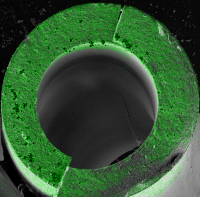-
Metal Oxide-infused Membranes Could Offer Low-Energy Alternative For Chemical Separations
CRĀSI member Prof. Mark Losego and GTPN member Prof. Ryan Lively are working on membranes that could separate chemicals without using energy-intensive distillation processes in a wide variety of products including gasoline, plastics, and food. The latest work, published in Chemistry of Materials and sponsored by the Department of Defense and the National Science Foundation, outlined a process for taking a polymer-based membrane and infusing it with a metal oxide network. The resulting membrane is far more effective at standing up to harsh chemicals without degrading.
-
STAMI Members Recognized as H-Index High Scorers
STAMI Members and Chemistry & Biochemistry Professors Jean-Luc Bredas (COPE, GPTN) and Seth Marder (COPE, GTPN, CRĀSI) have H-index scores greater than 100, a singular feat that is achieved by few researchers.
-
2018 STAMI Industry Partners Day
Georgia Tech's Center for the Science and Technology of Advanced Materials and Interfaces (STAMI) held its 2018 STAMI Industrial Partners Day and Exposition on Sept. 27-28, 2018 at The Historic Academy of Medicine. The meeting featured talks from leaders in industry and academia, student presentations, and networking opportunities.
-
STAMI-COPE Professors receive DURIP Grant for Advanced Solar Cell Fabrication Equipment
COPE, GTPN, and CRĀSI Professors Seth Marder, Zhiqun Lin, Natalie Stingelin, and Carlos Silva from the Schools of Chemistry and Biochemistry and Materials Sciences and Engineering have received a Defense University Research Instrumentation Program (DURIP) grant for equipment to establish a unique deposition and characterization station for a wide range of metal-halide perovskite materials that will allow control, with high precision, of thin-film deposition from solution in a controlled atmosphere, and enable characterization of the produced films during film formation as well as in device assemblies.
-
Material Formed from Crab Shells and Trees Could Replace Flexible Plastic Packaging
New materials developed in the labs of GTPN, CRĀSI, and SMI member Carson Meredith derived from crab shells and tree fibers has the potential to replace the flexible plastic packaging used to keep food fresh. GTPN, CRĀSI, and SMI members John Reynolds and Meisha Shofner were also part of the team.
The new material is described in the journal ACS Sustainable Chemistry and Engineering. See the Article in Research Horizons.





